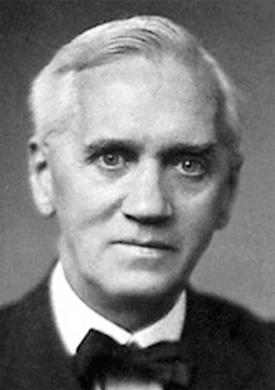Alexander Fleming
Alexander Fleming revolutionized the field of bacteriology with
his research. His discovery of penicillin profoundly changed medical
practice and the treatment of surgical infections, marking the
beginning of the antibiotic era. Not only did Alexander Fleming
discover it by chance, but also he did not fully realize the significance
of his discovery.
 Alexander Fleming
Alexander Fleming |
|
Alexander Fleming was born on a farm in Ayrshire, located in
the wilds of Scotland, on August 6, 1881. At the age of 14, he
moved to London to join his older brother Tom, where he took classes
at the commercial section of a high school, and then found work
as an employee for a shipping company.
In July 1901, he came into possession of a small inheritance,
which allowed him to resume his studies. He received a scholarship
from the medical school at St. Mary's Hospital Medical School,
where he presented a thesis on microbial infections and ways to
combat them. He graduated as a medical doctor and received a gold
medal from the University of London, in 1908. As he wanted to
become a surgeon, Alexander Fleming was awarded the title of Companion
of the Royal College of Surgeons.
Fleming begins to work with his former teacher, Sir Almroth Wright,
the head of the Laboratory of Bacteriology at St. Mary's Hospital.
He begins the work on the treatment of bacterial infections, which
at that time take their toll. He had a small research laboratory
in the basement of St Mary's Hospital, which became thereafter
the Wright-Fleming Institute.
Fleming's appointment as professor of bacteriology in 1928, attests
to his contribution to all sectors of research on infectious diseases.
On his return from vacation September 3, 1928, a miracle occurs.
He observed the growth inhibition of staphylococcal colonies on
a petri dish containing a culture of bacteria growing on a layer
of agar, a green mold, resembling that of Roquefort cheese. "That's
funny!" exclaimed Alexander Fleming.
He then observed that the green mold, which probably came from
an adjacent laboratory, has literally destroyed the bacteria culture.
He will find very quickly that this fungus is active in many bacteria.
Fleming discovered a fungus, which he called "Penicillium
notatum", which was to become the main component of Penicillin.
He published his discovery in 1929, but the Medical Research Club
remained skeptical about it. As Fleming was not a biochemist,
he did not have the necessary expertise to produce and purify
penicillin.
His discovery becomes especially important twelve years later
thanks to the work of Sir Howard Florey and his team at Oxford
University, who succeed in extracting and purifying the penicillin.
The therapeutic effects of penicillin and its safety for the human
body were recognized on August 6, 1941. This is the date on which
an article is published in the British medical journal The Lancet,
entitled "Further observations on penicillin."
In 1942, Fleming obtained amazing results in his first clinical
trial, curing the infection of a teenager with sepsis. Penicillin
became to be mass-produced during the Second World War and since
then, it has contributed to saving the lives of millions of people.
In 1945, Fleming was awarded the Nobel Prize for Medicine for
his discovery.
Rumor Has It …
… in grade school Alexander Fleming was prone to coughs and colds.
So his teacher nicknamed him "Phlegm Kadiddlehopper. True
story.
Written by Kevin Lepton
|

